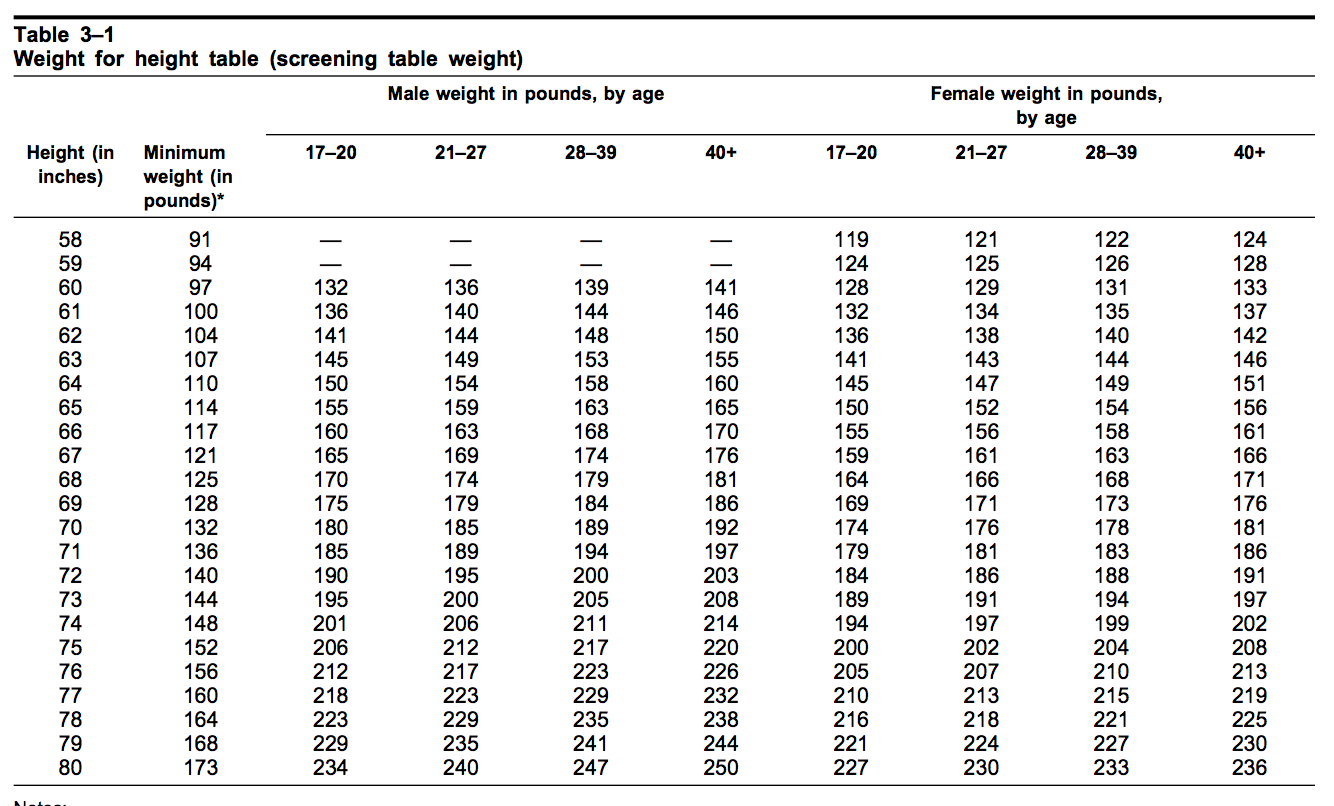The height weight army standards are crucial benchmarks that determine a soldier's fitness and readiness for service. These standards ensure that all personnel maintain a level of physical fitness that is essential for the demanding nature of military duties. In a force where strength, agility, and endurance are paramount, adhering to these standards is not just a matter of personal pride but also a requirement for operational success.
For many recruits, understanding these standards can be daunting. The military has specific criteria that vary depending on age, gender, and branch of service. Knowledge of these guidelines can aid individuals in preparing for their military journey, ensuring they meet the necessary physical requirements right from the start. Additionally, failing to meet these standards can lead to disqualification from service or remediation programs.
This article delves deep into the height weight army standards, exploring the requirements, implications for service members, and tips for achieving and maintaining these benchmarks. Whether you are contemplating a military career or are already serving, understanding these standards is imperative for your success and well-being in the armed forces.
What Are the Height Weight Army Standards?
The height weight army standards are specific measurements that the military uses to assess a soldier's physical fitness. These standards are designed to ensure that all personnel are fit for duty and can handle the physical demands of military service. Each branch of the military has its own set of standards, but they generally follow similar guidelines.
Why Are Height Weight Army Standards Important?
Maintaining the height weight army standards is vital for several reasons:
- Operational Readiness: Soldiers who meet these standards are generally more physically capable of performing their duties.
- Health and Wellness: These standards promote a healthy lifestyle among service members.
- Team Cohesion: Uniformity in physical standards fosters a sense of equality among soldiers.
- Discipline and Commitment: Adhering to standards demonstrates a soldier's commitment to their role and responsibilities.
How Are Height Weight Measurements Taken?
Height weight measurements are typically conducted during a soldier's initial entry into the military and at regular intervals thereafter. The process involves:
- Measuring height without shoes, standing straight against a wall.
- Weighing the individual on a calibrated scale.
- Comparing results against established tables that indicate acceptable weight ranges for each height.
What Are the Consequences of Not Meeting Height Weight Army Standards?
Failing to meet the height weight army standards can lead to serious consequences for service members, including:
- Enrollment in a Weight Control Program: Soldiers may be required to participate in programs aimed at helping them achieve the necessary weight.
- Administrative Actions: Repeated failures can lead to disciplinary actions and impact a soldier's career advancement.
- Separation from Service: In extreme cases, soldiers may be discharged if they consistently fail to meet standards.
How Does Each Branch of the Military Define Height Weight Standards?
Each branch has its own criteria, but they all use a similar approach to determine acceptable weight ranges. Here’s a brief overview:
| Branch | Standards Overview |
|---|---|
| Army | Uses height and weight charts; age and gender are considered. |
| Navy | Employs a body fat percentage standard in addition to height and weight. |
| Air Force | Focuses on both weight and body fat measurements. |
| Marines | Utilizes height and weight standards, alongside body fat percentage. |
What Tips Can Help Soldiers Meet Height Weight Army Standards?
Meeting the height weight army standards requires dedication and effort. Here are some tips to achieve and maintain these standards:
- Maintain a Balanced Diet: Focus on whole foods, lean proteins, and plenty of fruits and vegetables.
- Engage in Regular Exercise: Incorporate both cardio and strength training into your routine.
- Stay Hydrated: Drink plenty of water to support overall health and performance.
- Set Realistic Goals: Work towards gradual improvements rather than drastic changes.
Can Height Weight Standards Be Waived?
In certain circumstances, height weight standards may be waived, particularly if an individual demonstrates exceptional performance in other areas. However, these waivers are not common and often require extensive documentation and justification.
How Can Recruits Prepare for Height Weight Standards Before Joining the Military?
For recruits looking to meet the height weight army standards before joining, preparation is key. Here are some strategies:
- Start Early: Begin your fitness journey as soon as you decide to enlist.
- Consult a Fitness Professional: Seek guidance from trainers who understand military requirements.
- Focus on Physical Conditioning: Participate in activities that improve strength, endurance, and flexibility.
- Monitor Progress: Regularly check your weight and measurements to stay on track.
Conclusion: The Importance of Adhering to Height Weight Army Standards
Understanding and adhering to the height weight army standards is essential for anyone considering a military career. These standards not only promote individual health but also enhance the overall effectiveness and readiness of military personnel. By committing to a healthy lifestyle, soldiers can ensure they meet these benchmarks, enabling them to serve their country effectively and honorably.
You Might Also Like
Fivel Stewart: A Rising Star In The Entertainment IndustryUnveiling The Life Of Michael C. Hall's Son
Unlocking The Mysteries Of The June 3rd Zodiac Sign
Unraveling The Mystery Behind Hailey Welch Leaked
The Intriguing World Of Rizzler Age
Article Recommendations


